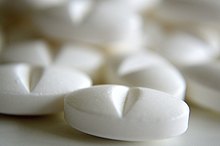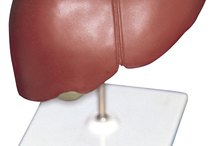Birth Control Pills & Elevated Liver Enzymes
Many women choose oral contraception because it effectively prevents unplanned conceptions and otherwise fits well with their lives. Some women do experience side effects, including elevated liver enzymes. If you take oral contraceptives or are considering them, you may want to learn more about their effects on the liver. Ask your doctor any questions you may have.
If you are experiencing serious medical symptoms, seek emergency treatment immediately.
Functions of the Liver
The liver is unique among bodily organs because it can regenerate itself. It can lose as much as 75 percent of its cells before it fails. This ability to sustain and recover from damage is fortunate. Among its over 500 known essential-to-life functions, the liver filters the body’s blood supply in order to clear and metabolize many different compounds it perceives as poisonous, including medications.
- The liver is unique among bodily organs because it can regenerate itself.
Drug Metabolism and Interactions
Elevated Liver Enzymes and the Gallbladder
Learn More
The liver metabolizes most drugs, including oral contraceptives. Thus it can be vulnerable to various kinds of DILIs, or drug-induced liver injuries. The liver is also the site of many drug interactions. One drug may speed up or slow down the rate at which the liver metabolizes another drug, intensifying or hindering its clinical effects. Many drug interactions with oral contraceptives can be explained by metabolic events within the liver. Drug interactions may worsen if DILI is present.
- The liver metabolizes most drugs, including oral contraceptives.
- Thus it can be vulnerable to various kinds of DILIs, or drug-induced liver injuries.
Elevated Liver Enzymes
Liver function is often assessed through blood tests of certain enzymes from the liver. Some of these test results, especially for alkaline phosphatase, or ALP, and total bilirubin, may be higher than normal in some oral contraceptive users. Elevated liver enzymes may result from liver inflammation or damage. Above-normal ALP and total bilirubin may indicate a type of DILI called “cholestatic hepatotoxicity.” This may involve jaundice, a yellowing of the skin and eyes, and sometimes additional and more serious liver problems. If you are on the pill and have elevated liver enzymes, ask your doctor what these test results mean in your case; whether you need further tests and treatments; and whether you should switch birth control methods 1.
- Liver function is often assessed through blood tests of certain enzymes from the liver.
- Some of these test results, especially for alkaline phosphatase, or ALP, and total bilirubin, may be higher than normal in some oral contraceptive users.
Contraindications
Does Cranberry Juice Help to Detox the Liver?
Learn More
“Family Planning: A Global Handbook for Providers” recommends against combined or estrogen-progesterone oral contraceptives or COCs and progestin-only pills or POPs on several liver-related grounds. Women with liver disorders like tumors, cirrhosis, hepatitis and jaundice, generally should not use COCs or POPs. Because of liver-based drug interactions, this manual also recommends that women on certain antiseizure medications, the anti-tuberculosis drug rifampicin and the anti-HIV drug ritonavir not take COCs or POPs.
- “Family Planning: A Global Handbook for Providers” recommends against combined or estrogen-progesterone oral contraceptives or COCs and progestin-only pills or POPs on several liver-related grounds.
- Because of liver-based drug interactions, this manual also recommends that women on certain antiseizure medications, the anti-tuberculosis drug rifampicin and the anti-HIV drug ritonavir not take COCs or POPs.
Alternatives in Family Planning
If your elevated liver enzymes, other medical conditions, or other medications conflict with COCs, POPs, or other hormonal contraceptives, you still have many family planning alternatives. Ask your doctor about precisely how and when you can switch to nonhormonal IUDs, condoms, a diaphragm, fertility awareness, vasectomy or tubal ligation. Exercise extra caution when and if you begin another family planning method or methods, as women are especially vulnerable to unplanned pregnancies during discontinuation of oral contraceptives.
Related Articles
References
- Epilepsy Foundation: Birth Control and Women With Epilepsy
- Merck Manual for Health Care Professionals: Liver Injury Caused by Drugs
- Merck Manual for Health Care Professionals: Pharmacokinetics: Metabolism
- Cleveland Clinic. Cirrhosis of the Liver. Reviewed January 11, 2019.
- David S, Hamilton JP. Drug-induced Liver Injury. US Gastroenterol Hepatol Rev. 2010;6:73–80.
- American Liver Foundation. Medications.
- Cleveland Clinic Health Essentials. Is Acetaminophen Safe to Take When You're Drinking? Published December 19, 2017.
- University of Michigan, Michigan Medicine. Methyldopa. Revised September 17, 2018.
- Elsevier Science Direct. Hypervitaminosis A. Published 2015.
- National Center for Biotechnology Information, U.S. National Library of Medicine. LiverTox: Clinical and Research Information on Drug-Induced Liver Injury: Vitamin A. Updated December 3, 2013.
- National Center for Biotechnology Information, U.S. National Library of Medicine. LiverTox: Clinical and Research Information on Drug-Induced Liver Injury: Niacin. Updated February 2, 2014.
- Amathieu R, Levesque E, Merle JC, et al. Insuffisances hépatiques aiguës sévères d'origine toxique : prise en charge étiologique et symptomatique [Severe toxic acute liver failure: etiology and treatment]. Ann Fr Anesth Reanim. 2013;32(6):416–421. doi:10.1016/j.annfar.2013.03.004
- Devarbhavi H. An Update on Drug-induced Liver Injury. J Clin Exp Hepatol. 2012;2(3):247–259. doi:10.1016/j.jceh.2012.05.002
- Johns Hopkins Medicine. Drug-Induced Hepatitis.
Resources
- “J. Repro. Med.”: Unintended pregnancies and...discont. OCs; M. Rosenberg et al.; May 1995
- Lab Tests Online: ALP
- Lab Tests Online: Bilirubin
- Mayo Clinic: Elevated Liver Enzymes
Writer Bio
Since 2000, Mary Krane Derr has written freelance for publications ranging from the medical journal "Allergy and Clinical Immunology International" to "The Polish American Encyclopedia." She holds a Master of Arts in social work from the University of Chicago and a Bachelor of Arts in biology from Bryn Mawr College.









